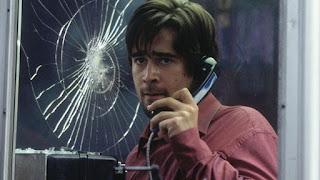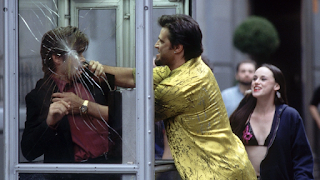In Manhattan, Stu Sheppard (Colin Farrell) is a cocky and fast-taking publicist, happy to obfuscate his way through life. Married to Kelly (Radha Mitchell), he is also romancing waitress Pam (Katie Holmes) and calls her regularly from a phone booth near Times Square to avoid cell phone records.
But today Stu answers a call at the booth from a mysterious Caller (Kiefer Sutherland), who threatens Stu's life with a sniper rifle. The Caller wants Stu to reveal his infidelity to Kelly, and apologize for all his other transgressions. After the Caller shoots dead a pimp interfering with the call, the police descend on the scene, as do Kelly and Pam. Captain Ed Ramey (Forest Whitaker) has to try and untangle a dangerous situation.
Written by Larry Cohen and directed by Joel Schumacher, Phone Booth was filmed in ten days and in sequence. The film's events take place in real time, Stu's ordeal wrapping up in 81 minutes, and the desired mood of taut efficiency is effectively sustained. Schumacher's agitated camerawork adds to the disorienting sense of suspense caused by an unseen foe.The basic theme of repentance and owning up to a pattern of nefarious behaviour is compelling, but also dragged out as Cohen struggles to keep Stu in the phone booth. The plot details surrender to illogic, most obviously to keep Kelly and Pam in danger, and some of the dialogue exchanges meander towards superfluous profanity in search of cheap shock value.
But Colin Farrell stands up to the role's rigours and carves a sweaty path from slick to desperate and frantic, literally holding the film in his hand. On the other end of the line Kiefer Sutherland's voice suggests a worthy villain. Unfortunately the script affords him God-like powers until the moments that matter most, and the duel between the two men deserves better motivation than Stu's small-scale sleaze.
Without withstanding much scrutiny, Phone Booth answers the call.
All Ace Black Movie Blog reviews are here.



No comments:
Post a Comment
We welcome reader comments about this post.